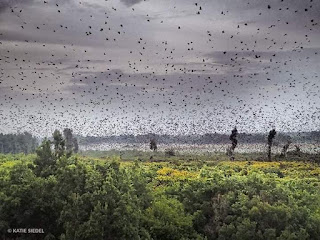At stake is the survival of ten million fruit bats which annually make their pilgrimage from the forests of the Democratic Republic of Congo to the Kasanka National Park in Chitambo District in Zambia.
This is considered the largest mammal migration in the world.
The fruit bats, whose scientific name is Eidolon Helvum, make this journey every year starting in early October and they stay in the park until late December.
They come to the Kasanka National Park to eat fruits and on their way, the bats pollinate plants and ensure nature thrives.
However, this annual pilgrimage is threatened by human activities.
A huge chunk of land near the park has now been turned into a farm and stakeholders are getting worried.
To put it into context, the Kasanka National Park is the home of the bats when they land in Zambia.
The park is managed by the Kasanka Trust Limited, a non governmental organisation which has huge interest in the survival of the bat migration.
Around the national park is the Kafinda Game Management (GMA) area which covers almost the entire Chitambo District in Central Province.
This GMA is a buffer and protects the park from humans.
Lake Group, a conglomerate which has several subsidiaries across Africa and the Middle East, seeks to establish a huge mixed use farm in the Kafinda GMA which is aimed at creating 1,000 jobs.
Some of its subsidiaries are Lake Oil, Lake Gas, Lake Steel, Lake Petroleum which runs several filling stations on the continent, Lake Trans which is the transport arm while Lakes Gas specialises in LPG and many others.
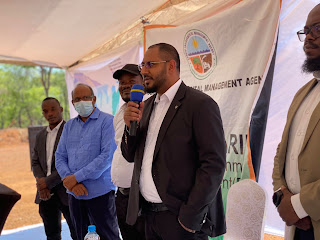 |
Lake Agro Industries Managing Director
Abdulaziz Ahmed speaking at the public hearing
- Pictures by ZEMA |
Lake Agro is now establishing a farm on a 3,000 hectares piece of land in the Kafinda GMA which the firm acquired from Chief Chitambo.
The firm has gone ahead to clear a huge chunk of land and planted maize, wheat and soya beans.
Nine center pivots have already been installed and are irrigating the fields.
This is despite their Environmental Impact Assessment (EIA) not being approved by the Zambia Environmental Management Agency (ZEMA).
The Environmental Management Act Number 12 of 2011 and the Environmental Impact Assessment Regulations; SI. No. 28, of 1997 all provide for any project of this magnitude to be approved by ZEMA before any works can commence.
Sensing that Lake Agro had already started works, ZEMA issued the company with a stop order on 11th October 2021.
The stop order was signed by the ZEMA Director General and it read in part:
“You are ordered to......... immediately cease the operation of all project activities at the project site. These activities include but not limited to land clearing, water abstraction from Luombwa River, operation of center pivots, maintenance of farm and support equipment, landscaping....”
Lake Agro Industries received and date stamped the stop order at its Ndola office on 13 October 2021 but did not abide by it.
By 29 October, 2021 when ZEMA held its public hearing at the project site, all farm activities were operating normally.
Possible Impact of the Agro Project on Biodiversity
As stated earlier, the project has already kicked off despite not being cleared by regulatory authorities.
at the public hearing, Lake Agro Industries General Manager Surya Rao Adapa gave an overview of what the firm has already done in Chitambo so far.
“We have already developed 560 hectares of land and planted three crops. We have already invested $9 million and paid a lot of taxes to authorities, “said Mr Adapa.
As part of its legal requirements to seek permission to kickstart its agriculture project in the Mapepala and Nabowa areas of Chitambo, Lake Agro industries prepared an Environmental Impact Assessment which was presented at the public hearing.
This blogger attended the hearing and now analysis some of the plans made by the investor.
Lake Agro contracted a local firm called Global Environmental Consultancy to prepare the EIA report which was presented to ZEMA.
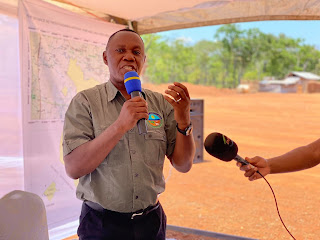 |
| ZEMA Director of Operations Morrison Songwe |
The organisation’s Lead Consultant Gillian Simfukwe made a presentation at the hearing.
Mr Simfukwe said the project is aimed at increasing crop production by irrigation to enhance food security in Zambia.
“The developer was initially given 10,000 hectares of land by Chief Chitambo which was reduced to 7,000 hectares and again that was reduced to 5,000 hectares and finally reduced to 3,000 hectares by the Department of National Parks and Wildlife,” said Mr Simfukwe.
He revealed that the Kafinda Game Management area was a sensitive biodiversity area which buffers the Kasanka National Park from human settlements.
He listed the following activities which are expected to come with the project by Lake Agro industries in the area:
- Land clearing for center pivots
- Abstraction of water from the Luombwa river.
- Construction of farm buildings and roads.
- Installation of power systems.
The consultant said the agriculture project is likely to have a lot of impacts on fauna.
He listed them as follows:
- Felling of trees which will impact a number of living and non living things.
- Generation of dust which will affect workers and wildlife.
- The bat migration will be affected.
- The abstraction of water will reduce the amount of water and affect people both downstream and upstream of the Luombwa river.
- Noise pollution will affect almost everything in the area.
- The center pivots will change the outlook of the area.
Mitigation Measures
Realising that the project will affect both fauna and flora, Mr Simfukwe said Lake Agro Industries plans to implement the following mitigation measures to protect this sensitive area.
- The company will protect the bufferzone in order to preserve the ecosystem.
- On felling trees, the firm wants to work hand-in-hand with the Forestry Department to stop indiscriminate cutting.
- Lake Agro wants to invest in dust suppression machines to reduce dust in the area.
- The firm said it will not be farming in dambo areas to project aquatic life.
- Use of latest water uptake equipment.
- The company will use reforestation to mitigate the effects of cutting down trees.
- Create 1,000 jobs to reduce poverty in the area
- Improve anti-poaching activities in the area.
Stakeholder Concerns
After the Consultant made his presentation, many stakeholders were not satisfied with Lake Agro’s plans to mitigate the impact of the investment.
Further, many stakeholders were not happy that Lake Agro Industries went ahead with the project despite ZEMA not having given the project a go-ahead.
When the floor was opened for questions and contributions, various people spoke out.
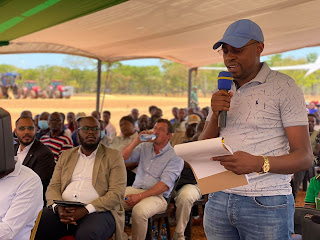 |
| Mehluli Malisa, the lawyer for Kasanka Trust Limited |
Mehluli Malisa, the lawyer for Kasanka Trust Limited was the first to speak and his concern was mainly why Lake Agro Industries disregarded several pieces of legislation and proceeded with the project without approval.
“You say you have complied with all laws, why was the Kafinda GMA plan ignored in your EIA? It has the force of law. Section 29 of the Environmental Management Act of 2011 says no development can take place without authorisation from ZEMA. Why is your project in full swing?”said Mr Malisa of Muyatwa Legal Practitioners in Lusaka.
He further questioned why Lake Agro industries ignored several stop orders from ZEMA and other government institutions which had ordered the company to move the project to the Nansanga Farming block which is a few kilometres away and has thousands of hectares of land reserved for commercial farming.
In response, the Lead Consultant Mr Simfukwe issued an apology on behalf of the developer.
“A wrong is a wrong and a right is a right and I believe in that. This was a wrong; they started before the EIA was approved. But there are channels that are responsible for that, those are channels we will wait to give us penalties if any.....,” he said.
At this point, Lake Agro Industries Managing Director Abdulaziz Ahmed chipped in to defend the company’s decision to kick start the project early.
“The late Chief, May His Soul Rest In Peace, insisted that the project continues because it will benefit the Nabowa and Mapepala communities. For this reason, we put our heads together and started the project. Today we are regularising everything and taking all concerns,” he said.
Another stakeholder from Lavushimanda District in Muchinga Province asked whether the company had acquired water rights from the Water Resources Management Agency (WARMA).
This question arose from the fact that Lake Agro is already using water from the Luombwa River to irrigate crops using center pivots.
In response, the company claimed to have water rights.
“Last year we got a temporal permit from WARMA for 6,000 cubic meters of water per day. We applied for more rights according to our plan. We received a demand notice and yes I can say we have water rights upto November,” said Mr Adapa.
However, WARMA was represented at the hearing and gave a clear picture.
Felix Kabombo, an Inspector at WARMA explained that Lake Agro Industries was only given a temporal permit for initial works and not for full scale irrigation.
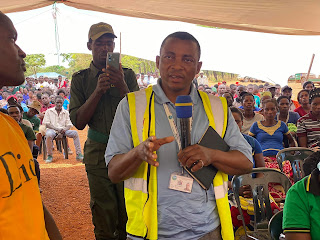 |
| WARMA Inspector Felix Kabombo |
“We only give a full five years permit after following all laws including clearance from ZEMA. At the moment, they (Lake Agro) only have a permit for developments they are doing, not irrigation,” said Mr Kabombo.
Others questioned the actual EIA and its contents.
For example, Kasanka Trust General Manager James Mwanza wondered why the developer opted to use hydraulic baseline data which is over 30 years old when latest reports are readily available.
To him, the use of outdated statistics was tantamount to misleading ZEMA and the public over the plans for the project.
For the World Wide Fund for Nature (WWF), an organisation which fights for the preservation of nature, their concerns were twofold: conditions of service for workers and mitigation measures proposed for the area.
 |
| WWF Head of Species Moses Nyirenda |
WWF Zambia Head of Species and Protected Areas Moses Nyirenda said investigations by his organisation have revealed that workers are being paid below the government-set minimum wage.
“What type of employment is here? Is it cheap labour or sustainable jobs? The rates offered are below the minimum wage...... This is a pristine area but your restoration and mitigation measures are vague,” said Mr Nyirenda.
In response, Ahmed said the company was providing sustainable employment and had already employed between 100 and 150 people.
For those involved in protecting birds in the wild, a project of this magnitude is a big concern to them especially that the Kasanka area is an important bird area.
“Are you aware that in addition to the bat migration which is being talked about, this area sits in one of the eight worldwide recognised bird migratory fly ways which is the East Atlantic Fly Ways?”asked Clara Nanja the Programme Manager at BirdWatch Zambia.
 |
| BirdWatch Zambia Programme Manager Clara Nanja |
Ms Nanja’s other concern was on where Lake Agro industries is planning to conduct its re-aforestation efforts.
She wanted to know whether it is the areas already cleared where center pivots are already installed and operating.
For the Department of National Parks and wildlife which is responsible for the management of protected areas the country, it made a 360 degrees u-turn at the public hearing.
This is the same institution which years ago gave Lake Agro Industries a go-ahead to set up the farm in the Kafinda Game Management Area.
However, at the meeting, it was a different story.
“The department is against large scale farming in the Game Manament Area. The location is in a sensitive area for the dispersal of bats in the Kasanka National Park. We recommend that this farming development is relocated to Nansanga Farming block where extensive farming is not in conflict with conservation,” said Sangulukani Phiri, who read a statement on behalf of the Department’s Director.
Mr Phiri said once the developer relocates to Nansanga, it should restore the area it has already cleared and ensure it is environmentally friendly for flora and fauna.
The Department however said if Lake Agro is allowed by ZEMA to operate in the GMA, it should be restricted to the 560 hectares it has already cleared to protect the environment.
Community Concerns
Among the many community members who spoke, their biggest issues were to do with access to water, sustainable jobs and importation of labour by Lake Agro Industries.
Maggie Mwelwa, a resident of Mapepala complained that the investor had brought supervisors from Tanzanians who were mistreating local workers.
 |
| A resident of Nabowa speaking at the hearing |
“There is a lot of segregation. They brought many people from Tanzania who are supervisors. Some workers come from the Copperbelt. We the locals are not benefiting. How are we going to educate our children,” she said.
Her view was shared by many other locals who complained about the foreigners.
“We appreciate this development, it has created jobs. However, they brought Tanzanians who are mistreating our people. I can even name those Tanzanians: Robert Tapo, Jimmy Tapo, Nchimunya Tapo and many others. Surprisingly, none of them has come to this meeting, why are they hiding?” said Harrison Mumba, a resident of Nabowa.
Other residents complained of unfair dismissals by Lake Agro Industries.
For example, Joseph Pengele, an old man, complained that he was fired two years ago and he has not been compensated.
He further said workers get injured at work but they are not given enough compensation.
Another resident who identified himself as Mukosha said in the three years the company had been operating, none of the local workers had signed contracts.
“None of our people here have seen contracts. Maybe workers from Ndola have signed contracts. But for workers from Nabowa and Mapepala, their jobs are terminated anyhow due to lack of contracts,” said Mukosha.
In response to these concerns by the community, Ahmed said he would send Human Resource Officers from Lake Agro Industries’ Ndola office to address concerns on mistreatment and intimidation.
Conclusion
In the end, the task now remains with the Zambia Environmental Management Agency to decide whether to issue clearance to the project or reject.
ZEMA also has the powers to punish Lake Agro Industries for having gone ahead to clear and plant crops on a 560 hectares piece of land which is deep in a game management area and threatens the annual bat migration which attracts thousands of tourists per year.
The outcry by non government organisations, government agencies and locals for this project are genuine because it has been hurried and threatens the very existence of the bats which are a marvel and an important part of the ecosystem in the Kasanka area.
For now, all eyes and ears are focused on ZEMA; everyone wants to know what decision the environmental watchdog will make.
“ZEMA has already made its professional verification of the project. Our Board will look at these issues and make a decision. All comments will be taken into account as we make a decision,” said ZEMA Acting Director General Simon Mwansa at the close of the public hearing.



